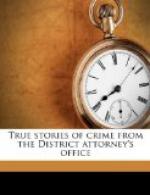Bott now began an endless and almost hopeless search for his beloved instrument, visiting every place where violins were sold, every pawnshop and second-hand store again and again until the proprietors began to think the old man must be crazy. Sometimes Flechter went with him. Once, the two travelled all the way over to New Jersey, but the scent proved to be a false one. Bott grew thinner and older week by week, almost day by day. When the professor did not feel equal to going outdoors Mrs. Bott went for him, and on these occasions often called at Flechter’s store to report progress, ask his advice and secure his encouragement.
One day during one of these visits in the July following the loss of the violin Flechter handed Mrs. Bott a sheet of paper, saying:
“I have written something down here. If you have that printed and put a reward to it you will get your violin back.”
The wording, partly printed and partly written in script, ran as follows:
VIOLIN LOST. $500 REWARD.
No questions asked for return of instrument taken from residence of Jean Bott March 31, 1894, 355 W. 31st St. Absolute safety and secrecy guaranteed. Victor S. Flechter, No. 21 Union Square, violin maker and dealer.
Mrs. Bott thanked him and took the notice away with her, but its publication had no result. The old professor began to fail, he no longer had an instrument upon which to teach his pupils, and those he could avail himself of seemed harsh and discordant. He had no appetite, and even found no solace in his pipe. Almost penniless they were forced to give up their lodgings and move to Hoboken. Mrs. Bott still kept up the search, but the professor could no longer tramp the streets looking for his violin. He sat silent in his room, slowly, surely, dying of a broken heart.
In course of time some one advised Mrs. Bott to lay her case before the District Attorney, and accordingly, during the summer, she visited the Criminal Courts Building and told her story to Colonel Allen, one of the assistants, who became greatly interested. The overwrought old woman had begun to suspect everybody, and even to accuse her husband’s friend, Flechter, of a lack of any real interest. She thought he ought to be able to find the violin if he really made the effort. Allen began to take notice. The sleuth in him pricked up its ears. Why, sure, certainly, Flechter was the one man who knew what Bott’s violin was really worth—the one man who could sell it to advantage—and he had been done out of five hundred dollars by the old musician’s stupidity. Allen thought he’d take a look into the thing. Now, there lived in the same boarding-house with Allen a friend of his named Harry P. Durden, and to Durden Allen recounted the story of the lost violin and voiced his suspicions of Flechter. Durden entered enthusiastically into the case, volunteering to play the part of an amateur detective. Accordingly Durden, accompanied by a Central Office man named Baird, visited Flechter’s place of business and the two represented themselves as connoisseurs in violins and anxious to procure a genuine Strad. for a certain Mr. Wright in St. Paul. Flechter expressed entire confidence in his ability to procure one, and did almost succeed in purchasing for them the so-called “Jupiter Strad.”




